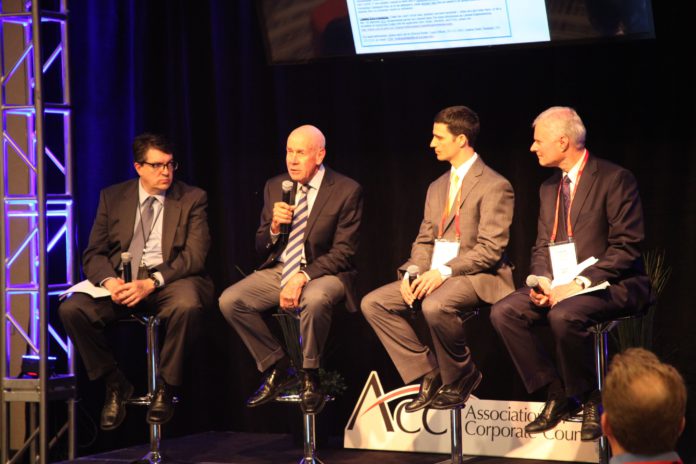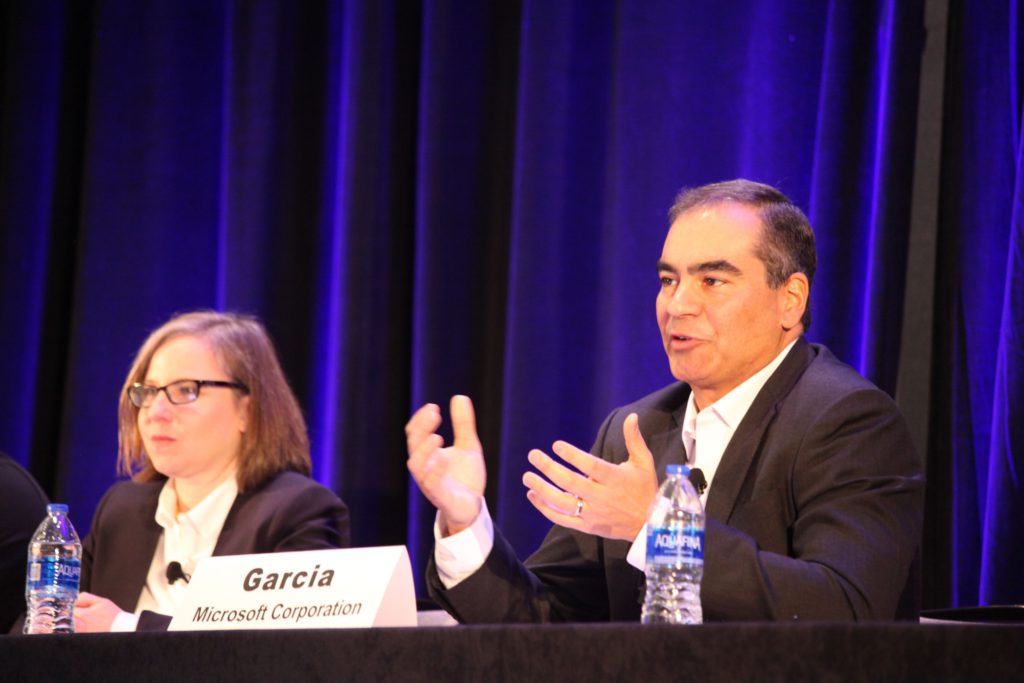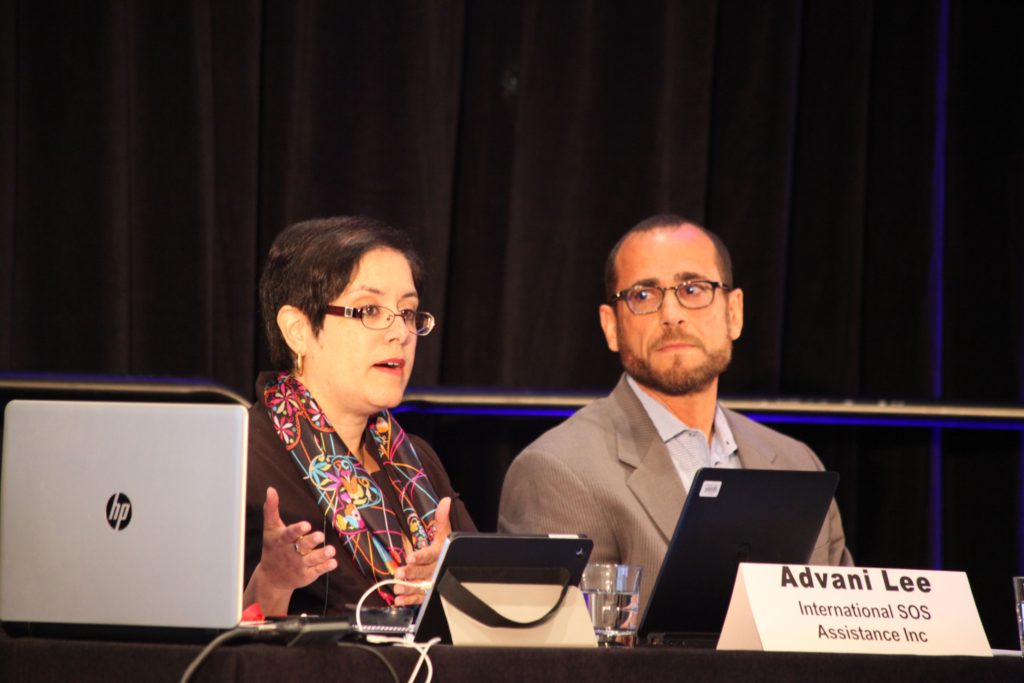
The Association of Corporate Counsel brought its global mid-year meeting to Denver for the first time April 22, when it kicked off a three-day conference at the Grand Hyatt focused on subjects affecting the in-house counsel world.
The CLE topics ranged from work-life balance to conflicts between legal and business considerations in contract formation.
AI in Legal Departments
One session in particular reached into issues that for many are still on the horizon and unpacked the esoteric realm of artificial intelligence and its uses for legal departments. The session, presented by Tranlin’s Liz Goldstein, LawGeex’ Shmuli Goldberg and Microsoft’s Dennis Garcia, outlined the nuances of AI’s ability to lighten legal teams’ workloads and allow them to focus on more human work, such as building relationships with business clients.
Goldstein gave insight on the use of AI systems in legal research and predictive analytics that also seemed to summarize AI’s purpose of helping legal departments work smarter rather than harder.
“Right now it’s all in our individual lawyer’s head what we think is going to happen, and we’re not even sure if what’s in our head is the same as the other person, or even how accurate it is,” Goldstein said. “Eventually [AI is] going to get very sophisticated and tell you how many times that judge gives summary judgment, how many times our opponent uses this argument. And this is going to make us better lawyers and more informed.”
Dennis Garcia, assistant general counsel at Microsoft, spoke about the intersection of AI with ethics. Some legal uses for AI, he said, can include self-help resources such as digital assistants and chatbots for common questions, compliance, streamlining contract review and cybersecurity. But much like other technological advances, the law and ethical rules haven’t caught up. Garcia said the American Bar Association and state ethics bar associations have not yet issued rules or opinions about AI-related issues.
“When you think about ethics and AI, it’s still very much in its early phases,” he said. The presenters said AI is best suited for functions involving high volumes of data input, such as reviewing contracts, so the algorithms can get smarter over time. AI is not well suited for tasks for which human touch is key, such as litigation.
One dilemma is whether interactions with digital assistants or chatbots create attorney-client privilege. In the meantime, before the ABA and other bodies provide guidance on this type of issue, Garcia said Microsoft makes sure only full-time employees have access to the information bots provide to users. Microsoft employs AI tools to answer common questions about the company’s policies and compliance and to aid with tasks such as contract formation, which frees up Microsoft’s legal professionals for other work.
“This might be a great opportunity for the ACC, quite frankly, to provide some guidance and best practices for in-house lawyers as to how they should think about using and deploying AI-related solutions,” he said.

According to the presenters, AI has to respect six core ethical principles: fairness, reliability and safety, privacy and security, inclusiveness, transparency and accountability. Transparency about the source and uses of data input is key for any AI system, and it seems AI’s capabilities are only as good as the data being fed to it. And when that foundational data fails, problems arise.
In 2015, Google Photos’ image-categorization software faced backlash for identifying black people as gorillas, a byproduct of not having enough diversity in the pictures of people fed into the algorithm for it to learn properly.
“You have to be inclusive in what data you’re putting into the computer,” Goldstein said. “The computer is a tool, but we’re still involved in it. It’s not some ivory tower where we can put things in and say, ‘it didn’t involve people, so there can’t be any bias or problem.’”
Although the ABA’s model rules have yet to catch up to the complexities of AI, some existing ones can guide lawyers on its use. Rule 1.1 governing competence, Garcia said, requires them to understand the risks and benefits associated with using relevant technologies.
“You don’t necessarily need to be an expert on AI, but you need, maybe, to get some third-party assistance and guidance and help to really understand what’s the capability of these AI systems,” he said.
Goldstein used spell-checking tools as an example of the need to recognize AI’s limitations. The tools might not catch mistakes in words that are spelled correctly but used improperly.
“Yes, it can augment you and do better than you, but you need to understand how tunable it is and how error-prone it is, because nothing’s going to be perfect,” she said. Some other current ethical rules that can provide guidance for using AI include ABA Rule 1.4 governing communications with clients and 1.6 for keeping information confidential.
Garcia said buy-in from everyone in a department is key to making adoption of AI systems successful. “If you have senior leaders who are really bought into this, that really trickles down and helps provide an incentive for others to do the same.”
Data Privacy and Security
New data privacy regulations out of the EU continue to be a high-priority issue for many U.S. in-house lawyers, and presenters covered that issue in detail. In less than a month, the EU is set to enforce its sweeping General Data Protection Regulation, or GDPR, which will place strict guidelines on how U.S. companies collect or process EU citizens’ personal data.
Shireen Advani Lee, legal general manager of International SOS Assistance Inc., said her company, which has 90 global offices subject to myriad international data privacy laws, has made broad preparations for the GDPR in terms of “data protection procedures, notices and general attitude.”
“The bottom line is we have to approach it as if everyone is an EU national, because they set the bar [so high],” she said.
With many in-house counsel having to roll up their sleeves on IT and information security issues, the question arises whether it’s worth it to become certified information privacy professionals, or CIPPs.
Lee’s co-presenter, Fannie Mae assistant general counsel Eric Spooner, recently stepped in to handle his organization’s privacy issues. Spooner doesn’t have a CIPP certification and doesn’t plan to get one due to the temporary nature of his role, but he noted his predecessor did, and he thinks “it can be valuable for those who practice regularly in this space.”
Advani Lee, who has a CIPP/US certification, said what made the certification most useful to her as an in-house lawyer was the education it provided her on technological concepts. Data privacy certifications carry with them an understanding of what concepts like consent, beacons or cookies are and whether the company is using them in a way that satisfies data privacy laws.
“For us, it’s not necessarily complicated to understand the law itself, it’s more how is that law being applied, and [what is] the technological dimension to how those laws are applied?” Advani Lee said.
When it came to determining her company’s readiness in data privacy and protection, the education she got from CIPP certification process was “arguably more valuable than the law,” she said, because lawyers can learn the law on their own.
Pro Bono Opportunities
Many in-house attorneys are probably glad their practice doesn’t involve litigating cases personally. But for those who would like to ply their craft in federal court, there are opportunities through the Civil Pro Bono Panel at Colorado’s federal district court, which panelists discussed in a “pop-up” presentation.
U.S. District Judge R. Brooke Jackson said 174 lawyers have volunteered for Colorado’s Civil Pro Bono Panel since 2013. Many volunteers are litigators who, lacking opportunities to get courtroom experience through their private firms, take up pro bono cases that go to trial. But the panel also welcomes volunteers who are traditionally non-litigators, Jackson said
“We judges are very pleased to have you volunteer,” he told the ACC meeting attendees. He added that in-house lawyers might intrinsically benefit from the challenge of pro bono representation. “Not only are you really helping the client … [and] the court, but I think you would find it interesting to dig into one of these cases and figure out what the issues are, what the law is, and go to court and argue a motion, maybe even try a case.”
The Colorado federal district court’s legal officer, Edward Butler, said 19 percent of cases assigned to the panel have gone to trial. A large portion of pro bono cases in the Colorado federal district are prisoner-involved cases, but they also include child abduction cases under the Hague Convention, civil rights cases and employment discrimination cases. In many employment discrimination matters, the volunteer might represent the defendant, as smaller companies in those cases sometimes can’t afford legal representation, Butler noted.

Ethics in Contract Negotiation
In-house attorneys, being the watchdogs for privileged information during contract negotiations, have their work cut out for them as the communications draw in more business units and a wider range of potential legal issues. In one of the presentations, a panel of in-house lawyers tackled a variety of related ethics questions.
Sometimes, the in-house lawyer might end up in discussions with the other company’s procurement personnel or another non-lawyer representative, and without that company’s legal counsel copied on email or on the phone. That communication can create tension with Model Rule 4.2.
Apttus assistant general counsel James Larsen said he has a “fairly liberal” interpretation of the issue.
He often presumes that if the other company is putting forth a procurement contact to negotiate, that person has the apparent authority to negotiate the contract on the company’s behalf. David Munn, general counsel of Pramata Corporation, said that if he’s dealing with a large company, he’ll sometimes assume their procurement contact is “deputized” by the legal department to deal with him.
Another hot topic was whether there is attorney-client privilege for emails where multiple departments across the company are copied.
Munn said these would be unlikely privileged, and that’s an example of where the in-house attorney should stop the normal flow of communication to raise a privilege issue.
“When you see an issue that you’re concerned about, that you might need to eventually assert privilege on, you need to limit the distribution of that email to the smallest number of people and to the highest level in the company that you can,” Munn said.
Clara Ohr, general counsel of East Coast Power and Gas, said it’s not just about the number of parties involved in the communication.
Attorneys also need to be cognizant about why they are having that communication — that is, if it passes the “primary purpose test” from in re Vioxx as having a primarily legal purpose as opposed to a business purpose, Ohr said.
— Julia Cardi and Doug Chartier

